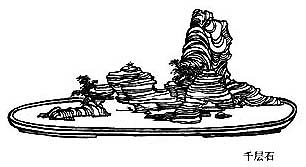詩
經
Shi Jing 
 – Le Canon des Poèmes
– Le Canon des Poèmes
Le plus ancien recueil connu de poésie chinoise, plus de trois cents chansons, odes et hymnes. Tr. Legge (en) et Granet (fr, incomplète).
Shijing IV. 4. (299)
| 載 色 載 笑 匪 怒 伊 教 |
其 馬 蹻 蹻 其 音 昭 昭 |
魯 侯 戾 止 其 馬 蹻 蹻 |
思 樂 泮 水 薄 采 其 藻 |
無 小 無 大 從 公 于 邁 |
其 旂 茷 茷 鸞 聲 噦 噦 |
魯 侯 戾 止 言 觀 其 旂 |
思 樂 泮 水 薄 采 其 芹 |
泮 水 |
||
| 靡 有 不 孝 自 求 伊 祜 |
允 文 允 武 昭 假 烈 祖 |
敬 慎 威 儀 維 民 之 則 |
穆 穆 魯 侯 敬 明 其 德 |
順 彼 長 道 屈 此 群 醜 |
既 飲 旨 酒 永 錫 難 老 |
魯 侯 戾 止 在 泮 飲 酒 |
思 樂 泮 水 薄 采 其 茆 |
泮 水 |
||
| 不 告 于 訩 在 泮 獻 功 |
烝 烝 皇 皇 不 吳 不 揚 |
桓 桓 于 征 狄 彼 東 南 |
濟 濟 多 士 克 廣 德 心 |
淑 問 如 皋 陶 在 泮 獻 囚 |
矯 矯 虎 臣 在 泮 獻 馘 |
既 作 泮 宮 淮 夷 攸 服 |
明 明 魯 侯 克 明 其 德 |
泮 水 |
||
| 元 龜 象 齒 大 賂 南 金 |
憬 彼 淮 夷 來 獻 其 琛 |
食 我 桑 黮 懷 我 好 音 |
翩 彼 飛 鴞 集 于 泮 林 |
式 固 爾 猶 淮 夷 卒 獲 |
既 克 淮 夷 孔 淑 不 逆 |
戎 車 孔 博 徒 御 無 斁 |
角 弓 其 觩 束 矢 其 搜 |
泮 水 |
||
Pleasant is the semi-circular water,
And we will gather the cress about it.
The marquis of Lu is coming to it,
And we see his dragon-figured banner.
His banner waves in the wind,
And the bells of his horses tinkle harmoniously.
Small and great,
All follow the prince in his progress to it.
Pleasant is the semi-circular water,
And we will gather the pondweed in it.
The marquis of Lu has come to it,
With his horses looking so grand.
His horses are grand.
His fame is brilliant.
Blandly he looks and smiles ;
Without any impatience he delivers his instructions.
Pleasant is the semi-circular water,
And we will gather the mallows about it.
The marquis of Lu has come to it,
And in the college he is drinking.
He is drinking the good spirits ;
And may there be given him the old age that is seldom enjoyed !
May he accord with the grand ways,
So subduing to himself all the people !
Very admirable is the marquis of Lu,
Reverently displaying his virtue,
And reverently watching over his deportment,
The pattern of the people.
With great qualities truly civil and martial,
Brilliantly he affects his meritorious ancestors.
In everything entirely filial,
He seeks the blessing for himself.
Very intelligent is the marquis of Lu,
Making his virtue illustrious.
He has made this college with its semicircle of water,
And the tribes of the Huai will submit in consequence.
His martial-looking, tiger leaders,
Will here present the left ears [of their foes].
His examiners, wise as Gao-tao,
Will here present their prisoners.
His numerous officers,
Men who have enlarged their virtuous minds,
With martial energy conducting their expedition,
Will drive far away those tribes of the east and south.
Vigorous and grand,
Without noise or display,
Without having appealed to the judges,
They will here present [the proofs of] their merit.
How they draw their bows adorned with bone !
How their arrows whizz forth !
Their war chariots are very large !
Their footmen and charioteers never weary !
They have subdued the tribes of the Huai,
And brought them to an unrebellious submission !
Only lay your plans securely,
And all the tribes of the Huai will be got !
They come flying on the wing, those owls,
And settle on the trees about the college ;
They eat the fruit of our mulberry trees,
And salute us with fine notes.
So awakened shall be those tribes of the Huai ;
They will come presenting their precious things,
Their large tortoises and their elephants' teeth,
And great contributions of the southern metals.
Legge 299

Le Canon des Poèmes – Shi Jing IV. 4. (299) – Chinois on/off – Français/English
Alias Shijing, Shi Jing, Book of Odes, Book of Songs, Classic of Odes, Classic of
Poetry, Livre des Odes, Canon des Poèmes.
Le Canon des Poèmes, Les Entretiens, La Grande Étude, Le Juste Milieu, Les Trois Caractères, Le Livre des Mutations, De la Voie et la Vertu, 300 poèmes Tang, L'Art de la guerre, Trente-six stratagèmes
Bienvenue, aide, notes, introduction, table.
Index – Contact – Haut de page
